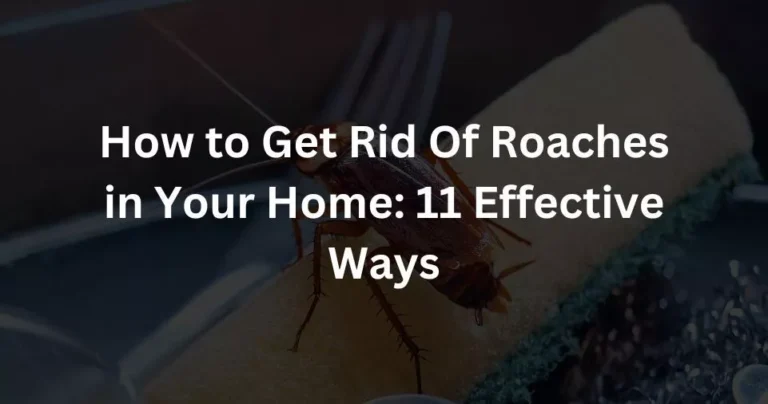How to Make All-Natural Ant Killer
Are you tired of seeing ants crawling around your kitchen, bathroom, or garden? Do you want to get rid of them without using toxic chemicals that can harm your family, pets, or the environment? If so, you’re not alone. Ants are one of the most common household pests, and they can be very hard to eliminate. They can carry bacteria, damage your plants, and contaminate your food.
But don’t worry, there is a solution. You can make your own all-natural ant killer using ingredients that you probably already have at home. This way, you can control the ants safely and effectively, without spending a lot of money or exposing yourself to harmful substances.
In this blog post, we will show you how to make a natural homemade ant killer that works. We will explain why ants are attracted to your home, what ingredients you need to make the ant killer, how to apply it, and how to prevent future infestations. By following these simple steps, you can get rid of ants for good.
Why are ants attracted to your home?
Ants are amazing creatures that can help your garden by recycling organic matter and aerating the soil. But when they invade your home, they can become a nuisance and a health hazard. You may wonder why these tiny insects choose to enter your house and how you can stop them. In this article, we will explain the reasons why ants come into your home, some common types of ants and their behaviors, and how to identify ant trails and nests. We will also share some tips on how to make an all-natural ant killer that is safe for you and the environment.
Food sources
One of the main reasons why ants come into your home is to find food. Ants have a keen sense of smell that allows them to track down a variety of foods, especially sugary ones. Spilled drops of soft drinks or fruit juices, candy, jellies and jams, cookies and other sweet baked goods, honey and syrup, and over-ripe fruit are some of their favorites1. They also like protein-rich foods such as meat, cheese, nuts, and pet food.
Ants are very social and communicate with each other using chemical signals. When one ant finds a food source, it leaves behind a scent trail to attract others. This can result in a massive infestation in no time2. That’s why it’s important to keep your food sealed in containers and to immediately wipe up spills from countertops and floors. Even the smallest crumbs can tempt them, so good housekeeping is a must.
Water sources
Another reason why ants come into your home is to find water. Ants need water to survive and thrive, especially in warmer weather. They will seek out any source of moisture they can find, such as water bowls for pets, leaking pipes, damp towels, or condensation on windows1. When they find a good source of water, they will also leave a scent trail for the rest of the colony2.
To prevent ants from coming into your home for water, you should fix any leaks or drips in your plumbing system, dry up any wet areas in your bathroom or kitchen, and empty or change your pet’s water bowl regularly. You should also avoid leaving dishes soaking in the sink or standing water in pots or pans.
Shelter
A third reason why ants come into your home is to find shelter. Ants like stable temperatures and humid conditions that are suitable for building nests and colonies34. They may enter your home when the weather is bad, such as during storms or droughts, or when their natural habitat is disturbed by construction or landscaping3.
Ants can nest in various places inside your home, such as cracks in walls or floors, behind baseboards or cabinets, under carpets or tiles, or inside electrical outlets or appliances1. Some types of ants can even damage your home by chewing through wood or insulation1.
To prevent ants from nesting in your home, you should seal any gaps or cracks in your walls or floors, inspect your furniture and appliances for signs of ant activity, and keep your indoor humidity low by using a dehumidifier or an air conditioner.
Common types of ants
There are many different types of ants that can invade your home, depending on where you live and what kind of food they prefer. Some of the most common ones are:
- Sugar ants: These are small brown or black ants that love sweets. They are usually harmless but can contaminate your food with bacteria.
- Carpenter ants: These are large black ants that can chew through wood and cause structural damage to your home. They are attracted to moist wood that has been damaged by water or fungus.
- Fire ants: These are red ants that have a painful sting. They can cause allergic reactions in some people and pets. They are aggressive and will defend their nests fiercely.
- Pharaoh ants: These are tiny yellow ants that can carry diseases such as salmonella and staphylococcus. They are difficult to control because they can split their colonies into multiple nests.
How to identify ant trails and nests
If you want to get rid of ants in your home, you need to find out where they are coming from and where they are going. Ants usually follow well-defined trails that they mark with pheromones1. You can use a flashlight to look for these trails along walls, baseboards, countertops, cabinets, windowsills, or door frames.
Once you locate the ant trail, you can follow it back to the entry point and the nest. The entry point may be a small hole or gap in your wall or floor, or a crack in your foundation. The nest may be inside or outside your home, depending on the type of ant. You can look for signs of nesting activity, such as piles of dirt, wood shavings, or dead ants.
What ingredients do you need to make an all-natural ant killer?

If you want to get rid of ants in your home without using harsh chemicals, you can make your own all-natural ant killer using ingredients that you probably have in your pantry. These ingredients are not only effective at killing or repelling ants, but also safe for you and the environment.
In this article, we will list the ingredients and their benefits, explain how they work to kill or repel ants, and provide some safety precautions when handling these ingredients.
Vinegar
Vinegar is one of the best natural ingredients for eliminating ants from different areas of your home. It can act as a killer as well as a repellent. Its pungent smell prevents most species of ants from invading your home and becoming a nuisance1. You can also use vinegar to get rid of fruit flies and gnats from your kitchen.
To use vinegar as an ant killer, you will need:
- White vinegar
- Water
- Spray bottle
To make and use the vinegar solution, follow these steps:
- Mix one part of vinegar and one part of water in a spray bottle2.
- Spray the solution directly on the ants and their trails.
- Wipe up the dead ants with a paper towel and discard them.
- Repeat as needed until you see no more ants.
Baking soda
Baking soda is another natural ingredient that can kill ants effectively. It is not a poison, but it reacts with the ants’ stomach acid and causes them to explode3. Baking soda is also harmless to humans and pets, unless ingested in large amounts.
To use baking soda as an ant killer, you will need:
- Baking soda
- Powdered sugar
- Small container or lid
To make and use the baking soda bait, follow these steps:
- Mix equal parts of baking soda and powdered sugar in a small container or lid3.
- Place the bait near the ant trails or nests.
- Wait for the ants to eat the bait and die.
- Dispose of the dead ants and the bait.
Borax
Borax is a natural mineral that can poison ants and other insects. It interferes with their digestion and kills them slowly3. Borax is also a common ingredient in many household products, such as laundry detergent and cosmetics.
To use borax as an ant killer, you will need:
- Borax
- Honey or sugar
- Small container or cardboard
To make and use the borax bait, follow these steps:
- Mix one part of borax and three parts of honey or sugar in a small container or cardboard3.
- Place the bait near the ant trails or nests.
- Wait for the ants to eat the bait and die.
- Dispose of the dead ants and the bait.
Safety precautions
While these natural ingredients are safer than chemical pesticides, they are still not completely harmless. You should take some precautions when handling them, such as:
- Wear gloves when mixing or applying the solutions or baits.
- Avoid contact with your eyes or skin. If contact occurs, rinse with water immediately.
- Keep away from children or pets who may ingest them accidentally. If ingestion occurs, call a doctor or a veterinarian immediately.
- Do not use on plants or surfaces that may be damaged by vinegar or borax.
How to make and apply an all-natural ant killer?
You have learned why ants come into your home and what ingredients you need to make an all-natural ant killer. Now, you may wonder how to make and apply different types of ant killers using these ingredients. In this article, we will provide step-by-step instructions on how to make different types of ant killers: spray, bait, powder, etc. We will also explain how to apply them effectively: where to spray or place them, how often to reapply them, how long to wait for results, etc. We will also provide some examples or pictures of the process.
Spray
Spray is a convenient and versatile type of ant killer that you can use to kill ants on contact or to repel them from certain areas. You can make a spray using vinegar, water, and essential oils.
To make a vinegar spray, you will need:
- White vinegar
- Water
- Spray bottle
Bait
Bait is another type of ant killer that you can use to lure ants to eat a poisonous substance that will kill them slowly. You can make a bait using borax, sugar, honey, or other sweet substances.
To make a borax bait, you will need:
- Borax
- Sugar or honey
- Small container or cardboard
Powder
Powder is another type of ant killer that you can use to sprinkle on the ants or their trails. You can make a powder using baking soda, powdered sugar, or diatomaceous earth.
To make a baking soda powder, you will need:
- Baking soda
- Powdered sugar
- Small container or lid
How to prevent future ant infestations?

You have learned how to make and apply an all-natural ant killer using common ingredients. But what if you want to prevent ants from coming into your home in the first place?
In this article, we will give you some advice on how to keep ants away from your home, suggest some natural repellents that you can use, and emphasize the importance of regular maintenance and inspection.
Keep your home clean
One of the best ways to prevent ant infestations is to keep your home clean and tidy. Ants are attracted to food sources, especially sugary and greasy ones. Therefore, you should:
- Store your food in sealed containers or in the refrigerator.
- Wipe up spills and crumbs from countertops, floors, and tables.
- Wash your dishes and utensils after every meal.
- Empty your trash cans regularly and keep them covered.
- Clean your pet’s food bowls and water dishes daily.
By keeping your home free of food scraps and residues, you will make it less appealing for ants to enter and explore.
Seal the entry points
Another way to prevent ant infestations is to seal the entry points that ants use to get into your home. Ants can squeeze through tiny cracks and gaps in walls, floors, windows, doors, and foundations. Therefore, you should:
- Inspect your home for any cracks or holes and seal them with caulk or silicone.
- Replace or repair any damaged screens or weather stripping on windows and doors.
- Trim any branches or plants that touch your house or roof.
- Remove any piles of wood, leaves, or debris near your house.
By sealing the entry points, you will make it harder for ants to find a way into your home.
Use natural repellents
Another way to prevent ant infestations is to use natural repellents that ants dislike or avoid. Some of these repellents are:
- Vinegar: As mentioned before, vinegar can kill ants on contact and disrupt their scent trails. You can also use it as a repellent by spraying it around the perimeter of your house or on any potential entry points.
- Essential oils: Some essential oils, such as peppermint, clove, lemon, or cinnamon, can repel ants with their strong smell. You can use them as a repellent by spraying them around your house or by soaking cotton balls with them and placing them near ant trails or nests.
- Spices: Some spices, such as black pepper, cayenne pepper, cinnamon, or garlic, can also repel ants with their smell or taste. You can use them as a repellent by sprinkling them around your house or by making a paste with water and applying it to ant trails or nests.
By using natural repellents, you will create a hostile environment for ants and discourage them from entering your home.
Maintain and inspect
The last way to prevent ant infestations is to maintain and inspect your home regularly. Ants can be very persistent and adaptable, so you need to be vigilant and proactive. Therefore, you should:
- Check your home for any signs of ant activity, such as trails, nests, or damage.
- Monitor the effectiveness of your ant killers or repellents and reapply them as needed.
- Contact a professional pest control service if you have a severe or recurring ant problem.
By maintaining and inspecting your home regularly, you will be able to detect and eliminate any ant infestations before they get out of control.
You may also like reading: Split-Level Homes Are Perfect, and I Will Die on This Hill
Conclusion
You have learned how to make your own all-natural ant killer using simple ingredients and methods. You have also learned how to prevent future ant infestations by keeping your home clean, sealing the entry points, using natural repellents, and maintaining and inspecting your home regularly. These natural methods are safe, effective, cheap, and eco-friendly. They will help you get rid of ants in your home without harming your health or the environment.
We hope you enjoyed this article and found it useful. If you did, please share it with your friends and family who may also have an ant problem. And if you have any questions or feedback, please leave a comment below. We would love to hear from you!
FAQs
Q: What is the best natural ant killer?
A: There is no definitive answer to this question, as different types of ants may respond differently to different natural ant killers. However, some of the most popular and effective natural ant killers are vinegar, baking soda, borax, essential oils, and diatomaceous earth. You can use these ingredients alone or in combination to make sprays, baits, or powders that will kill or repel ants.
Q: How long does it take for natural ant killers to work?
A: The time it takes for natural ant killers to work depends on several factors, such as the type and size of the ant colony, the type and amount of the ant killer used, and the frequency and method of application. Generally speaking, natural ant killers may take longer to work than chemical pesticides, but they are safer and more eco-friendly. Some natural ant killers may kill ants on contact (such as vinegar or essential oils), while others may take a few days or weeks to kill the entire colony (such as borax or diatomaceous earth).
Q: Are natural ant killers safe for pets and children?
A: Most natural ant killers are safe for pets and children, as they are made from non-toxic ingredients that are commonly found in households. However, some natural ant killers may still pose some risks if ingested or inhaled in large amounts (such as baking soda or diatomaceous earth). Therefore, it is advisable to keep these natural ant killers out of reach of pets and children, and to use them with caution and moderation. If you suspect that your pet or child has ingested or inhaled a natural ant killer, contact your doctor or veterinarian immediately.






